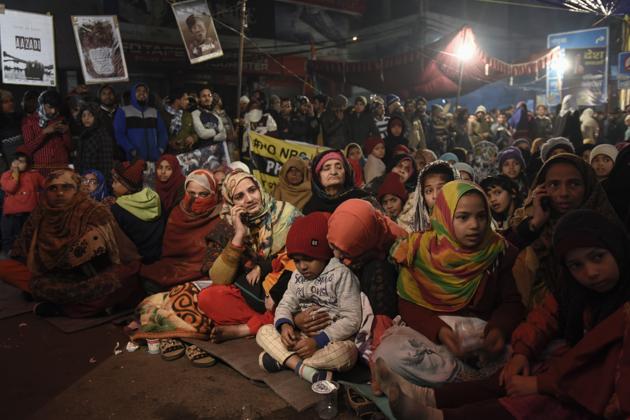The fury of Shaheen Bagh’s women, writes Rajdeep Sardesai
Their voices reveal both the fragility of communal relations and trust deficit with the government
In normal times, Delhi’s Shaheen Bagh area would easily fall off the map: A dingy, congested locality with open drains and dangerously dangling power cable lines. But these are not normal times in the overcrowded areas that surround Jamia Nagar, the epicentre of anti-Citizen Amendment Act (CAA) protests in the national capital. Which is why the otherwise nondescript Shaheen Bagh has suddenly found a voice that resonates far and wide. Every day, round the clock, braving the severe winter cold, large groups of women sit in protest here on the street. Raising slogans, chanting songs, seeking justice, shattering every stereotype. Not a stone has been thrown here in anger even though the rage is palpable. The fury is as much against the Delhi police who entered the Jamia library and targeted students as it is against the Narendra Modi government which, they are convinced, is “anti-Muslim” in intent.

Few of those gathered seem to have read the fine print of the new law, but insist that the legislation is “draconian”. “Bharosa nahi hai (we don’t trust)”, when I remind them of the prime minister and home minister’s repeated promises that no Indian Muslim would be affected by the CAA and their claim that the National Register of Citizens has not even been discussed. Clearly, this is a battle of perception as much as of the legislative minutiae, a conviction in the minds of the protestors that the Modi government has a discriminatory, majoritarian mindset.
“But aren’t you all also benefitting from government schemes like Ujwala, Mudra Yojna or an Ayushman Bharat, where is the Hindu-Muslim narrative in that?” I ask. “This is only for votes at election time, do you really think that the prime minister treats us as equal citizens, unke sarkar ke liye hum sab aantakwadi hain, (we are all terrorists for his government)!” an elderly woman hits back. Remember Shaheen Bagh is not too far from Batla House, another Muslim-dominated zone in the neighbourhood that shot into public imagination after a terror encounter here in 2008.
I persist with my line of questioning, and ask them about the incidents of violence that have taken place in Jamia and parts of Uttar Pradesh during the anti CAA-NRC protests: Buses burnt, public property damaged, firearms being used. “You TV persons keep showing images of a burning bus, we give roses and water to the police here,” a young woman in a bright salwar-kameez responds. TV news is the new “enemy”, the so-called “godi [pliant] media” seen as a surrogate of an autocratic State machinery.
A WhatsApp video of a senior police officer from Meerut telling protestors to “go to Pakistan” has gone viral. Amoral technology cuts through religious boundaries, and every incendiary video only adds to the sense of being encircled and persecuted by the “other”. “Would any policeman speak like this to any Jat or Gujjar protestor, why should wearing a skull cap and a beard, or a burqa or hijab lead to our patriotism being questioned?” says an infuriated lady. I mumble something incoherently about how not every police officer is communal-minded, only to be cornered again by another livid voice: “Forget policemen, there are ministers in this government who keep telling Muslims to go to Pakistan!” (the reference I presume is to Giriraj Singh, a serial offender in this regard).
This isn’t the only video that has gone viral in a highly surcharged atmosphere. I point to a video of Amanatullah Khan, the local Aam Aadmi Party Member of Legislative Assembly, making a provocative speech where he warns the crowd that its getting difficult for Muslims to breathe and live with freedom. “Is this not a brazenly communal speech, why don’t you call him out?” I ask. The response is just as combative: “Look, Amanatullah is our leader here, if he takes up our cause, what’s wrong with it? Don’t Amit Shah and Yogi make similar speeches, didn’t the PM make a shamshan-qabristan speech?”
The argumentative interaction continues for almost an hour. Its getting darker and colder, but the crowd isn’t melting away just yet. Some women have brought blankets, and are planning to spend the night under the icy skies. I am preparing to leave when one of them gets in a last word: “Next time, please call us to the studio instead of the maulvis that you always do!”
Maybe I really should. Maybe our VIP ministers too should meet and listen to Shaheen Bagh’s women, and step out of their self-comforting echo chambers of privilege. Trapped between victimhood and rage, these are voices that are both revealing and scary. They reveal the volcanic lava that is bubbling under the surface of increasingly fragile communal relations, threatening to erupt at the slightest trigger point. The divisive CAA-NRC debate has been one such trigger that has only further polarised the fault lines within an already fragmented society. And yes, brought the incensed women of Shaheen Bagh onto the streets.
Post-script: As I get into my car, and switch the heater on, I gaze at the potholed roads, hanging power cable lines, crazily crowded by-lanes. I wonder when we will see urban protests break out over lack of jobs and crumbling infrastructure. Or, will the toxic narrative of “muscular” Hindutva and aggressive Islamism remain the overriding messaging, one that is ominous for society, but perhaps politically convenient for the leadership of both communities?




